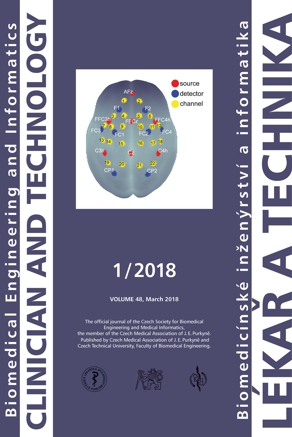AGCU BIMETALLIC NANOPARTICLES MODIFIED BY POLYVINYL ALCOHOL – THE CELLS VIABILITY STUDY IN VITRO
Keywords:
AgCu NPs, cells A2780, cells A375, nanoparticle, viabilityAbstract
The effects of elementary metallic nanoparticles on living objects as cytotoxicity or antibacterial activity are widely known. Ag nanoparticles are a suitable and well known example. Nanoparticles formed by an alloy of Ag and Cu stabilized by polyvinyl alcohol were examined on two human tumor cells - ovarian carcinoma cells A2780 and skin melanoma cells A375. Bimetalic AgCu nanoparticles were synthetized by using a method of chemical co-reduction of silver nitrate and copper (II) nitrate hydrate. The nanoparticles were characterized by electron microscopy and by measurement of zeta potential. Cell viability was tested by using an MTT (tetrazole colorimetric viability assay) test. The effect on cell apoptosis and necrosis was measured by using flow cytometry. The experimental results indicate a differentiated impact of nanoparticles on the cells used. A more significant effect of viability decrease was observed for A2780 cells. The cell death caused by the nanoparticles used was observed particularly in the form of initial and advanced apoptosis for both cells lines, necrosis was observed to a lesser extent. The synthetized bimetallic nanoparticles seem to be a suitable candidate for targeted suppression of cell proliferation.
Downloads
Published
Issue
Section
License
Copyright (c) 2018 Vladan Bernard

This work is licensed under a Creative Commons Attribution 4.0 International License.
Authors who publish with this journal agree to the following terms:
- Authors retain copyright and grant the journal right of the first publication with the work simultaneously licensed under a Creative Commons Attribution License (https://creativecommons.org/licenses/by/4.0/) that allows others to share the work with an acknowledgment of the work's authorship and initial publication in CTJ.
- Authors are able to enter into separate, additional contractual arrangements for the non-exclusive distribution of the journal’s published version of the work (e.g., post it to an institutional repository or publish it in a book), with an acknowledgment of its initial publication in this journal.
- Authors are permitted and encouraged to post their work online (e.g., in institutional repositories or on their website or ResearchGate) prior to and during the submission process, as it can lead to productive exchanges.
CTJ requires that all of the content of the manuscript has been created by its respective authors or that permission to use a copyrighted material has been obtained by the authors before submitting the manuscript to CTJ. CTJ requires that authors have not used any copyrighted material illegally, as for example a picture from another journal or book, a photo, etc. It is the author’s responsibility to use only materials not violating the copyright law. When in doubt, CTJ may ask the authors to supply the pertinent permission or agreement about the use of a copyrighted material.
The opinions expressed in CTJ articles are those of authors and do not necessarily reflect the views of the publishers or the Czech Society for Biomedical Engineering and Medical Informatics.


